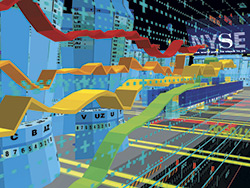We have borrowed the term "World Brain" from H. G. Wells (British science fiction writer, 1866-1946), who, in 1937, wrote an essay by that title. He wrote "...the most hopeful line for the development [of] intelligence lies rather in the direction of creating a new world organ for the collection, indexing, summarizing and release of knowledge, than in any further tinkering with the highly conservative and resistant university system, local, national and traditional in texture, which already exists."
Wells's vision of a microfilm-based endeavor was never completed, but new technologies of the circuit and dataset have made his dream possible. The Web is an incarnation of what he called the "Permanent World Encyclopedia," thanks to the visionary work of people from Vannevar Bush (American engineer and science administrator, 1890-1974) to Tim Berners-Lee (British inventor of the World Wide Web, born 1955) who were building on an intellectual foundation laid by those such as Babbage (English mathematician and philosopher, 1791-1871), Lovelace (English program creator, 1815-52), and the African griot. Not long ago, thinkers envisioned the Web as no more than an efficient distribution channel, with the ability to send out massive quantities of information. It was the dream of having thousands of channels with content produced by the media giants and made available to the public. Instead, the public began to produce their own content. Millions of blogs have sprung up on every conceivable topic. The online encyclopedia, Wikipedia, began with the improbable notion that anyone could write about whatever topic they wanted, and that the Internet community would be an efficient editor. Meanwhile, YouTube has become a repository of anything anyone wants to say about anything, filtered by the very contributors who made it. By combining the circuit's ability to distribute creativity with the lowered cost and availability of digital tools, the realm of the circuit today changes the very definition of amateur.
Jorge Luis Borges'(Argentine writer, 1899-1986) 1941 story The Library of Babel describes a nearly infinite library, filled with books composed of every possible combination of words and letters. The protagonist spends his days wandering the library searching for the one true catalog to the library. He is defeated by his realization that he has no means to differentiate the true catalog from the many false ones. Today, we are saved from despair by the realization that there is not one true catalog, that culture is woven together by many different and sometimes contradictory narratives. Google's dominance of the search engine market comes from the realization that the "true" catalog is everywhere. Search engines themselves are part of the search for meaning.
The World Brain is culture, and what we collect feeds that brain. Collection is part of the human urge to create. As our ancestors developed technologies to write, they formed rudimentary libraries, often the hub of centers of learning and inquiry. From these developed great centers of commerce and civilization, like the one that grew around the libraries of Timbuktu, the great African trading city of the fifteenth century.
The digital age provides an amplification of our ability to collect and to share. Traditional collections, from works of art to Barbie dolls are of course collections of physical objects. Even the abstract ideas contained in the books of a library needed to take physical form. Today, we have virtual repositories of our personal collective enterprises, from the contents of our iPods to our social networking pages at MySpace or Facebook. The "World Brain" is a living organism of connected synapses, provided by creative interlocutors, which can grow in rhizomatic ways. As Kevin Kelly (American publisher and editor, born 1952) writes, we are training the Web. Each link we click, each post we make, each Wikipedia article we write, or edit, or link to adds a bit to the interactive dialog of the World Brain. In a very real sense, the synapses of the World Brain become reinforced through experience and use, in the same way that our human brains learn, grow, and amalgamate. Michael Wesch (American anthropologist and digital enthnographer) notes: "the Web is us/ing us."
How do we find meaning from the seeming chaos of the Internet? It has become increasingly clear that the more effective filters are not those that point to a single answer, but instead those that enable individuals to come to their own conclusions and find their own meanings by analyzing the behaviors of that individual and others.
- Michel Foucault (French philosopher, 1926-1984), Politics, Philosophy, Culture







